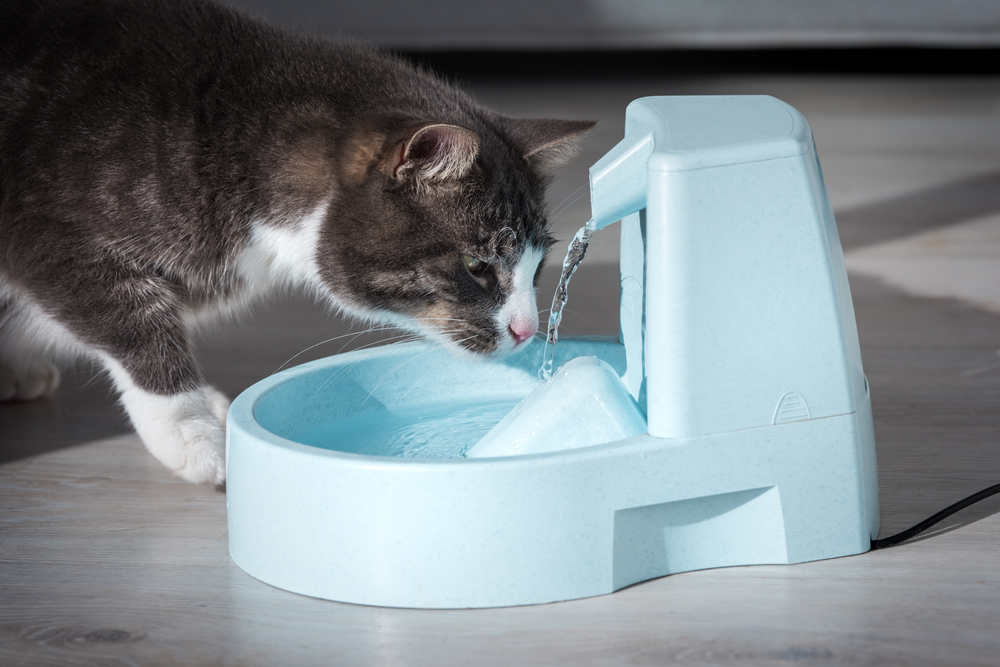One of the most common reasons cats come to our clinic is for urinary problem treatment. Bladder inflammation or infection can result from acute or chronic stress, and urinary crystals or stones can form secondary to infection or poorly understood metabolic and dietary factors. If inflammatory debris, crystals, or small stones stick together and become stuck in the urethra, the result is a complete urinary obstruction—which our Groves Veterinary Clinic team calls “a blocked cat.” If you own a neutered male cat, learn to recognize the early signs and when to seek treatment for your pet.
Why male cats become blocked
Male or female cats and dogs can experience a urethral blockage, but this occurs rarely except in male cats, who have a long, narrow urethra that can be easily blocked by inflammatory cells and debris, small bladder stones, mucus, or muscle spasms around the urethra. Inflammation, crystals, or stones can form in cats with a disease complex called feline lower urinary tract disease (i.e., FLUTD), whose causes are multifactorial, but chronic stress and diet are considered the biggest contributing factors.
Blocked cat signs
Blocked cat signs can develop slowly over a few days, or suddenly over a few hours. Any male cat can become blocked, but those who experience a stressful event or have a concurrent illness or a urinary tract disease history are more at risk than the general cat population. Initially, blocked cats may show the following signs:
- Frequent trips to the litter box, but producing little or no urine
- Crying out or straining in the litter box
- Blood in the urine
- Lethargy and unwillingness to move
- Distended, tender abdomen
- Poor appetite
The kidneys and urinary system filter toxins from the blood, and when urine cannot pass, this system stops working, and toxins quickly build up in the bloodstream, causing vomiting, weakness, dehydration, and death within 24 to 72 hours.
Blocked cat diagnosis and treatment
Diagnosis can usually be made with a history, physical exam, and palpation of a large, distended bladder. X-ray or ultrasound can confirm the distended bladder and show any small stones in the bladder or urethra. Blood tests are important to determine kidney function and electrolyte levels, and to decide if sedation is safe.
Treatment includes intravenous (IV) fluid therapy and placing a urinary catheter to dislodge the blockage and restore normal urine flow, flush toxins from the body, and re-establish normal kidney function. The urinary catheter is sewn in place, and cats stay in the veterinary hospital for several days to receive fluids and medications to relax urethral spasms, and to monitor urine output and blood toxin levels. Most cats are discharged with medications and a special diet to prevent recurrence, which can happen hours, days, or years down the line.
Long-term outlook for blocked cats

Unfortunately, cats who block once are likely to block again, because FLUTD tends to wax and wane, and scar tissue can further narrow the urethra. However, recurrence rates can be reduced with preventive measures, including:
- Therapeutic diet — Special veterinary prescription diets can acidify urine, dissolve stones, prevent crystal formation, and limit inflammatory episodes. For picky cats who refuse the prescription diet, an over-the-counter urinary health formula may provide more benefit than regular pet food, or pet owners may choose a home-prepared, nutritionist-formulated diet.
- Increased water intake — Diluting urine by increasing water intake can reduce crystal formation and help flush debris from the entire urinary tract. Most cats drink minimally, because they prefer clean, running water over stagnant water from a bowl. Canned foods or a water fountain can increase your cat’s water intake—many cats enjoy watching the flowing water.
- Stress reduction — Stress contributes to urinary disease, but ongoing, low-level stressors can be difficult for pet owners to identify. Almost anything can stress a cat, but common culprits include other pets’ bullying, boredom, house construction, or guests. Keep cats engaged with daily playtime, toys, and other enrichment strategies to increase overall wellbeing, and address inter-cat aggression or bullying with a qualified trainer.
- Medications — Anxiety medication may help chronically stressed cats, and urinary medication or supplements can improve overall urinary function and help prevent crystals, stones, or infections.
- Surgery — Cats who block repeatedly despite these management strategies are good candidates for surgery that reroutes urine flow and creates a larger urethral opening. Cats may be more prone to urinary tract infection after surgery, so ongoing monitoring is still necessary.
Time is of the essence if you suspect your cat is blocked, so seek emergency veterinary care as soon as you notice a problem. Contact our Groves Veterinary Clinic team for a consultation to help you identify stressors in your home, adjust your cat’s diet, and establish baseline urinary health, or if you notice subtle changes in your pet’s urination habits.







